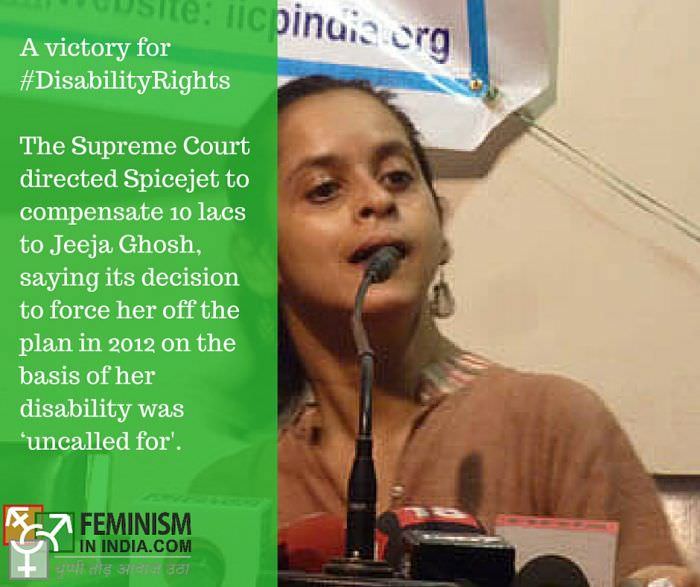This week saw some very good news, in the form of a Supreme Court Judgment that has been hailed as a victory of the disabled community. The judgment concerned the case of Jeeja Ghosh, a prominent disability rights activist, who was de-boarded off a plane by SpiceJet in 2012, on the basis of her disability.
Flying to attend a conference in Goa, from Kolkata, Ghosh had the traumatic experience of being de-planed, as she later found out, due to her disability. Ghosh who has cerebral palsy approached the Hon’ble Supreme Court of India, under Article 32 of the Constitution, given that her fundamental rights had been violated. In its judgment, the Supreme Court, having made references to several international instruments and Aviation Requirements issued by the Director General of Civil Aviation, and the Persons with Disabilities (Equal Opportunities, Protection of Rights and Full Participation) Act, directed the airline to pay her INR 10,00,000 as damages. The judgment can be found here. While analysing this judgment, and understanding its impact on the rights of persons with disabilities a few things need to be kept in mind.
Flying may end up becoming a very traumatic experience for persons with disabilities.
Despite awareness building exercises and the passing of legislation to protect the rights to persons with disabilities, ‘ableism’ remains a deeply entrenched attitude. Cases of insensitivity with which persons with disability are treated, are a corollary to this ableism. In January this year, a person with disability reported that she was made to ‘crawl’ by the airline, as the airline could not arrange for a wheelchair for her. In the same month, reports came in of a woman passenger forced to remove her prosthetic leg, an ordeal that she has had to face multiple times. It is likely that the reports we hear about are the tip of the iceberg and there are incidents of discrimination that persons with disability face, which go unreported for a variety of reasons.
Disability as a social construct
To fix the issue of discrimination in transportation in general and air travel in particular, it is important to understand that disability is a social construct. This view rather than looking at a disability as some sort of ‘deviation from the norm’ focuses on social expectations of health which create institutions and arrangements that exclude persons who don’t conform to those expectations. The former view would look at disability as the factor which restricts the choices of an individual with disability, while the latter looks at social arrangements as responsible for restricting an individual’s choices and freedoms.
If disability is looked at as a social construct, it becomes obvious that providers of services at airports, and airlines need to make reasonable accommodations so that persons with disability may travel with comfort and in dignity, and enjoy their privacy while doing so. It makes no sense that a customer who happens to have a locomotor disability have a less comfortable ride than a customer who does not happen to have it.
The right to fly with dignity
As flying becomes a routine part of our lives, it must be considered that a wide range of international instruments and national laws on disability guarantee persons with disabilities rights the thrust of which is on dignity and autonomy. Article 3 of the Convention on the Rights of Persons with Disabilities guarantees to individuals with disabilities the rights of accessibility and full participation and inclusion in society. Article 9 of the Convention places an obligation on the State to ensure that persons with disabilities have access to transportation on an equal basis with others.
Section 44 of the Persons with Disabilities Act specifically deals with non-discrimination in transport, and places an obligation on establishments in the transport sector to take reasonable steps to adapt the vessels/ crafts and the toilets in them in a way that makes it comfortable for persons with disabilities to use them with ease.
The judgment of the Supreme Court in the case of Jeeja Ghosh also made a reference to the Civil Aviation Requirements (CARs) dated 1st of May 2008, which the Hon’ble Court held that the airline had acted in contravention of. Subsequently CARs have been issued in 2014, addressing the lacunae in the CARs of 2008. The CARs 2014 forbid the airlines from refusing to carry persons with disability or those with reduced mobility along with their assistive devices/aides/ guides etc., and place the onus on the Airline to give options to the passenger so that they may select the required facilities at the time of the booking. The CARs are extensive, and go into great detail regarding the potential problems that may be faced by air travellers and the steps required to be taken by the airlines to address the same. These CARs may be read here. The judgment in Jeeja Ghosh’s case made suggestions regarding tweaking these CARs further.
Obligations on private airlines.
One of the more important features of this judgment is that the onus of guaranteeing the rights of persons with disabilities was not affixed merely on the Government. The judgment observed that private airlines share this obligation, extending the principle that if a particular service is provided by a private entity but is open to public, the private entity must take into account issues of accessibility.
It is hoped that this judgment, and the public engagement with this issue is going to ensure that the transport sector, among others, ensures that persons with disabilities can travel with dignity.
Disclaimer: This article was originally published on author’s blog here.
About the author(s)
Srishti Agnihotri regularly appears in Trial Courts, the Delhi High Court and the Supreme Court of India. She is involved in research and advocacy on women's rights and child rights. She completed her Masters in International Human Rights Law from the University of Notre Dame, USA.



